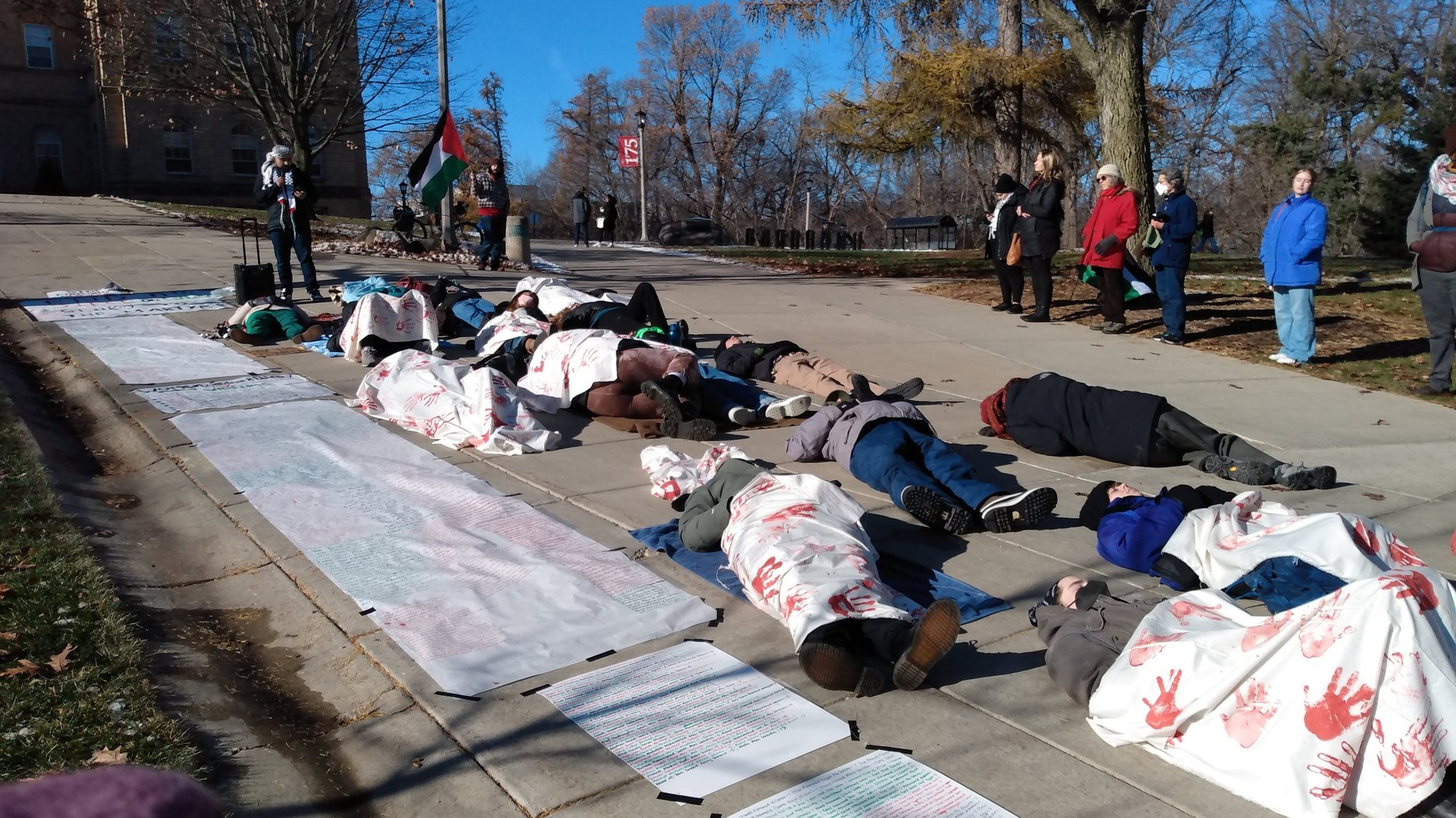03/29/24 Reposted from progressive.org
Since October 7, Chabad houses have sent tens of thousands of dollars to the Israel Defense Forces—potentially in violation of both campus rules and their nonprofit status.
On February 18, the Rohr Chabad House at the University of Wisconsin–Madison, a Wisconsin-based branch of the Zionist student network Chabad on Campus, hosted a talk by Oz Bin Nun, an Israeli Fellow for the Jewish Agency for Israel and a special unit commander in the Israel Defense Forces (IDF).
In a video of the talk posted online, Bin Nun readily admits that the Israeli military is killing Palestinian children in Gaza, which ignited a campus controversy over whether he was bragging about the military’s actions or lamenting them, as reported by student newspaper The Daily Cardinal.
But amid this debate, another startling admission in the talk by Bin Nun was buried: Students from the university had apparently helped purchase drones and body armor for the IDF. During his presentation, between footage of Israeli air strikes, Bin Nun shares a video of training exercises for what he calls “a war in Lebanon yet to come.” One scene features Israeli soldiers flying a drone.

“This, thanks to UW–Madison, they bought us some drones,” says Bin Nun. “Thank you Badgers! [in a reference to the university mascot].”
Chabad at UW–Madison is just one of many Chabad groups on campuses across the United States that have raised tens of thousands of dollars for the IDF since October 7. The Rohr Chabad House web page for its recent campaign states that $37,660 was raised for this purpose. A website for another similar fundraising campaign in New York City identifies the purchase price of each “specialized drone” as $7,500.
These contributions are potentially in violation of both campus rules and the group’s nonprofit status.
Chabad-Lubavitch is a religious movement of Orthodox Jews, which operates more than 3,500 Chabad houses in eighty-five countries around the world to support educational and outreach activities. Among those are more than 260 “Chabad on Campus” houses on or near universities and colleges throughout the United States that organize holiday celebrations and activities for Jewish students. Although Orthodox Jews run the gamut from Zionist to non-Zionist to anti-Zionist, Chabad boasts of its leadership being “actively involved in settlement of the Holy Land.”
Since October 7, Chabad houses on campuses across the United States have also been actively fundraising for the Israeli military. A cross-section of Chabad houses investigated by The Progressive discovered such fundraising activities in disparate parts of the country, at both public and private schools, including: UW–Madison, Rutgers University, Pennsylvania State University, Miami University in Ohio, and Princeton University.
None of the Chabad houses contacted by The Progressive responded to multiple requests for comment—except the one at UW–Madison.
“We are happy and proud that so many Jewish students and members of the UW community contributed towards the humanitarian aid of helping Hamas’s victims and their protectors in the IDF,” says Mendel Matusof, the director and rabbi of Chabad at UW–Madison.
Matusof describes the drone purchased with the funds as intended for a volunteer search and rescue group—but that description is at odds with Bin Nun’s lecture.
“Basically what we are doing since [October 7] until almost today is to play a really weird game in which we are hiding, searching for Hezbollah terrorists [referring to the Lebanese political party and militia group],” Bin Nun said in his presentation. “They’re hiding, searching for us, and the first one to make a mistake is the first one to die.”
Chabad on Campus houses are oriented towards accommodating students, but they are not always formally affiliated with the adjacent college or university. Some houses, like Chabad of Princeton University, are recognized by school administrations as “affiliated chaplaincies.” Others, like Chabad at the University of Wisconsin–Madison, serve students without being formally affiliated with any school.
Perhaps unsurprisingly, the administration at UW–Madison is quick to distance the university from Bin Nun’s statements.
“Contrary to information shared at a recent event, the university has not provided drones or funding for drones to Israel or the IDF,” says John Lucas, assistant vice chancellor of university communications at the University of Wisconsin-Madison. “Any such fundraising was conducted privately, without the involvement of UW–Madison.”
“[Rohr Chabad] does not make use of UW branding or marks,” Lucas explains, in spite of the Chabad’s website and logo using the University’s trademarked “W.” Lucas emphasizes that “UW-Madison did not play a role in selecting the recent speaker, nor does it endorse the views that were shared at that event.”
Policies at UW–Madison generally restrict on-campus fundraising to efforts benefiting registered 501(c)(3) charitable organizations. While Matusof declined to clarify to The Progressive if any of the Chabad at UW–Madison’s fundraising was done on campus, all of the beneficiaries listed on the campaign’s web page—American Friends of Magen David Adom, ZAKA, Friends of the Israel Defense Forces and Chabad’s Terror Victims Project—are registered charities. This means they probably would not run afoul school policy.
But Chabad at UW–Madison and other groups fundraising for the Israeli military may be running afoul of nonprofit laws, according to Charlie Swift, head of criminal defense at the Muslim Legal Fund of America. Swift explains that, while there are few legal restrictions on financial or material support from individuals in the United States to Israel—including unique provisions allowing active duty U.S. military personnel to also serve in the Israeli military—nonprofits in the United States are bound by their charters.
“The IRS regulations do not authorize a 501(c)3 to raise military money for these sorts of things,” says Swift. “My sense would be that that would be outside its mission.”
According to its mission statement, Chabad at the University of Wisconsin–Madison is “a Jewish student resource for the education and practice of the religion Judaism.” Raising money for the Israeli military likely doesn’t fit within that mission.
“It doesn’t, which is why it was a clearly defined, separate, and specific fundraiser,” says Matusof. But, he adds, “Encouraging people to give towards humanitarian causes—including the IDF—is absolutely part of the education and practice of Judaism.”
Ethan Cohen of Jewish Voice for Peace in Philadelphia strongly disagrees, telling The Progressive, “Conflating Judaism with Zionism, linking Jewish student groups with the genocide in Gaza, will make the world less safe for all of us.”
Loss of nonprofit status for organizations like Chabad houses would make them less attractive to donors, as well as subjecting the organizations themselves to taxes.
Anti-Zionist student groups like Students for Justice in Palestine see on-campus Chabad houses raising funds for the Israeli military as yet another reason for schools to both academically boycott and financially divest from Israel. The University of Wisconsin, for example, has an endowment valued at nearly $3.5 billion. Faculty and students have been pushing the administration to divest from Israel since at least 2004.
“While every single university in Gaza has been destroyed by the Israeli regime,” says Carrie Zaremba, spokesperson for the National Students for Justice in Palestine, “our universities not only continue to fund these bombs but also allow Zionist extremists to fundraise additional support for the Israel occupation force’s ongoing genocide.”

